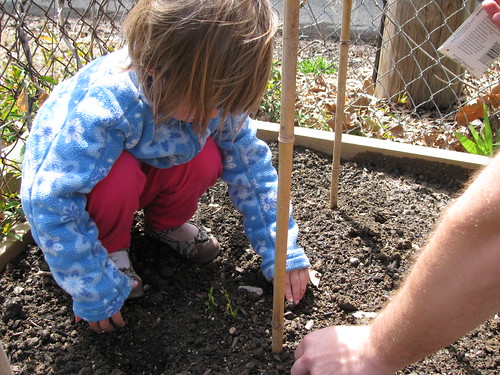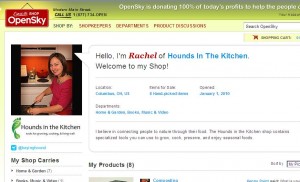The snow is melting and spring is around the corner. Columbus has an abundance of interesting local food and gardening events again this month. Enjoy!
Hounds in the Kitchen events
 Kids Cook - Thursdays from 11:15am-12pm at Sprout Soup. This month we'll be going bananas on the 4th, serving up maple syrup on the 11th, and cooking the exotic quinoa on the 18th. $4 per child.
Kids Cook - Thursdays from 11:15am-12pm at Sprout Soup. This month we'll be going bananas on the 4th, serving up maple syrup on the 11th, and cooking the exotic quinoa on the 18th. $4 per child.
Kids Cook EGGstravaganza - Saturday March 20 from 12 - 1:30 pm. at Sprout Soup. Kids of all ages can join in the fun of decorating an egg, making a late lunch, and visiting with a laying hen. $5 per child; $15 family maximum. Please RSVP to Rachel.
Urban Edible Gardens - Tuesday March 30 from 7 -8 pm at Greenovate, 9 East 2nd Ave Columbus 43201. Come to Rachel's workshop filled with techniques on how to include an edible garden in your environment, be it a backyard, patio, or deck. She will share information about raised beds, containers, plants best suited to Ohio conditions, and low impact low budget tips to start gardening this season.
Events hosted by others (in chronological order)
Maple Syrup festivals are being held around the city. Check out the Maple Syrup 2010 post for dates and locations.
Columbus Winter Farmer's Market March 6 and 20 from 9 am - 1 pm at First UU Church, 93 W Weisheimer Dr. Purchase Ohio grown and made goods, enjoy live music and space to sit and chat at the Winter Farmer's Market. (Here's my review from a January visit.)
Urban and Container Gardening- Saturday, March 06, 2010 10 a.m. - 12 p.m. at Stratford Ecological Center 3083 Liberty Rd., Delaware, OH. Stratford’s farmer will gear this class to the small backyard or patio grower, sharing information on rainwater harvesting, composting, maximizing your space, extending the growing season, and using containers to “grow your own.” $20/person or $30/family.
Hills Market Oscar Dinner - March 6 - $35 per person - 6:30 p.m. at Hills Market. This dinner, served in the Wine Department, is a compilation of courses inspired by all five 2009 Oscar Nominees for Best Picture. This evening will feature five courses, four wines and three film critics: John DeSando, co-host of WCBE’s It's Movie Time, Cinema Classics, and On the Marquee, Johnny DiLoretto co-host of WCBE's Cinema Classics and entertainment reporter for Fox 28, and Kristin Dreyer Kramer, co-host of WCBE’s It's Movie Time and On the Marquee and editor-in-chief of NightsAndWeekends.com. $35 per person. Call 614.846.3220 or e-mail manager@thehillsmarket.com for reservations.
North Market cooking classes include Seafood Suppers on Sunday March 7, and Eastern European on Wednesday March 24. Their chef series continues with The Refectory on Thursday March 18 and Trattoria Roma on Wednesday the 31. All classes are $50 per person or $125 for 3. Visit their events calendar for more information.
Ohio Market Day - March 13, 10 a.m. - 2 p.m. At Hills Market. This event features dozens of our favorite Ohio vendors, more than 100 prizes, free hot dogs from Boar's Head (11 a.m. to 1 p.m.) workshops and a day-long midwest beer sampling in the Wine Department. Free.
Composting Workshop - Tuesday March 16 7 pm at Worthington Library, 820 High St. Attendees will learn safe, simple and effective methods to start their own home composting program in this FREE workshop. All are welcome!
King Corn and Big River movie screenings - March 22 at 7 pm at Studio 35. This event is held in celebration of World Water Day, while we also kick off Earth Month with Aveda Institute Columbus. Join us and find out more! Doors open at 6pm and the movie begins at 7pm. Admission is $7.50 and a portion of the proceeds will go to Sierra Club's Central Ohio Clean Water Campaign.
Ohio Maple Dinner - March 23 at 6:30 p.m. at Hills Market. Enjoy a perfectly-balanced three course meal (paired with wines hand selected by Wine Director Constance Begue) to complement the delicious maple syrup harvested by Lewisville, Ohio's Misty Mountain Estates. $35 per person. Call 614.846.3220 or e-mail manager@thehillsmarket.com for reservations.
What's on Your Table? - Saturday March 27 from 9am - 1:30pm at Columbus Menonite Church, 35 Oakland park ave. An intriguing discussion led by trailblazing Cleveland chef & well-known food advocate, Parker Bosley. Local foods pioneer, Mary Holmes, will give the keynote, followed by presentations from area food activists arranged by the Clintonville Farmer's Market. $12 for materials and lunch.
Organic Gardening - Saturday March 27 from 10 am - 12 pm at Stratford Ecological Center, Delaware Ohio. Gardening without chemicals is nothing new; humans thrived on naturally-grown food for centuries. In this class, you’ll observe the organic perspective of viewing your garden as a natural and diverse system, learning the basics of composting, companion planting, crop rotations, pest control and more. Pictures will inspire and clarify. $20/person or $30/family.
Raised Beds and Natural Gardening 101, Saturday, March 27, 2010 at Blue Rock Station, Zanesville, Ohio. Learn how to use thermal mass, passive solar,
and lots of other easy techniques to enhance your garden growing knowledge
and become a true eco-manager. $35 per person. E-mail Annie at annie@bluerockstation.com or give her a call at (740) 674-4300 for reservations.
 The premise:
The premise:


 Today we ate our last
Today we ate our last  I love my two
I love my two  My favorite source for barrels is the friendly folks at
My favorite source for barrels is the friendly folks at 

 Direct sowing is one of Lil's favorite garden projects. She is good at punching her finger down to make holes and covering the seeds back up. We label rows with old plastic silverware, popsicle sticks, or whatever else is available. I lust after reusable metal
Direct sowing is one of Lil's favorite garden projects. She is good at punching her finger down to make holes and covering the seeds back up. We label rows with old plastic silverware, popsicle sticks, or whatever else is available. I lust after reusable metal  I recently spoke at the
I recently spoke at the  sponsored by OEFFA among other local whole foods organizations. On March 22, Studio 35 will host a discussion among local food advocates and show the film for an admission price of $7.50 starting at 6 pm. Visit the
sponsored by OEFFA among other local whole foods organizations. On March 22, Studio 35 will host a discussion among local food advocates and show the film for an admission price of $7.50 starting at 6 pm. Visit the  There's a new way to find goodies to help you grow, cook, and eat simply: shop the
There's a new way to find goodies to help you grow, cook, and eat simply: shop the 

 The sun calls me outside; the bitter cold pushes me right back down into this chair.
The sun calls me outside; the bitter cold pushes me right back down into this chair.